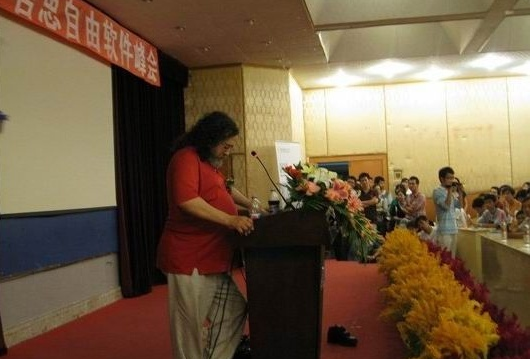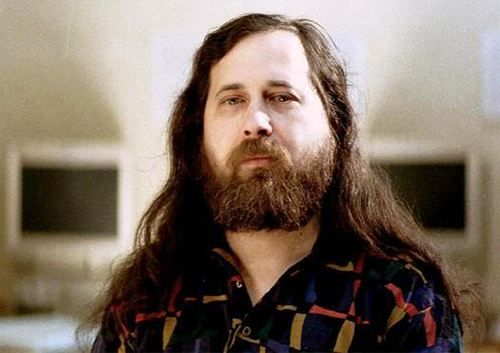It's always a contradiction when masters are ridiculous on one hand and cute and respectable on the other. It was him before Steve Jobs changed the world.
Recent attention has been drawn to a gray-bearded hacker in the software field. If you do not recognize Richard Stallman's name, he has another title: the founder of the Free Software Foundation. Another lesser-known fact is that he contributed at least half to creating the Linux operating system.
Celebrating his 69th birthday, the outspoken programmer once had some striking ideas.
Bashing Apple and Ubuntu
Stallman claimed that the Mac is becoming a "prison" and it's challenging for users to install their favorite programs to run the device. In addition, he did not recommend Ubuntu (GNU/Linux distribution based on Debian) either.
He said several vital packages are now distributed only through their non-freedom-respecting package system rather than as Debian packages. It is more challenging than ever to get any freedom from an Ubuntu installation.
Stallman compared Ubuntu to a "proprietary and restrictive operating system" such as Windows or macOS.
"Zoom is unjust" & "Games are bad unless they are not free."
Stallman calls it a "shame" to use non-free software like Zoom in a class. "It requires users to run a non-free client program. Using a non-free program puts you under the power of its owner — in this case, Zoom. That power includes the power to make the program mistreat users and limit users."
For games, he thinks each user is pressured by all the other users to continue doing something bad for you.
"I don't think there's anything bad about playing a game. And, unless the game is not free, then it is bad for you if you play it. But typically these games are not solitary. You are playing with other people. And using a non-free program together with other people that's particularly bad, because it means that those people are pressuring each other to keep running that non-free program."
Every time a non-free program creates an effect where each user is forced to do something that's not good for them by the other users. That makes them all morally responsible for pressing the others.
Stallman truly serves as a "freedom" guardian under all circumstances.
However, he is not 100% against it when it comes to copyright.
"Copyright covering works and monopolizing the use of the contents of those works is very similar to the Enclosure Laws. Enclosure was basically theft, and copyright is vicious in a similar way, when it's used to stop people from sharing. "
He believes that it is legitimate for there to be copyright to cover commercial distribution and use of a work and public display of its modification. However, exact copies of any published work should be allowed for non-commercial redistribution.
Path of Glory
Stallman has done many sensational things that are often hard to understand.
The movement he started aimed to establish a foundation for a technology that, at the time, offended the entire software industry.
Unix was the dominant operating system at that time, but users had to pay the American Telephone and Telegraph Company to use it.
Despite its usefulness, Stallman believed that software whose source code is inaccessible to users contributes nothing to innovation and even decreases innovation chances. Therefore, Stallman created a free operating system that was similar to Unix.
In September 1983, his new project was released: GNU.
GNU contains three terms of protocol: GPL, LGPL, and GFD, and requires that software be distributed in source code form. It allows users to copy or distribute software in the form of source code to other users. With GNU, software sharing is not limited to using software made by others; the code used to make that software can be extracted directly, and some people may even use that code to contribute to their creations.
So far, he has been the organizer of the GNU project and the leading developer of some of the most widely used GNU software, including GCC, GDB, and GNU Emacs.
The Free Software Foundation was founded by Stallman in October 1985, following the start of a controversial free software movement.
The term "free" here refers to freedom, not being free of charge.
He is not entirely opposed to open source fees. The charging of fees is sometimes reasonable if it is necessary to maintain technologies.
However, Stallman's movement was rooted in his understanding of the "sharing of ideas," and he believed private software could isolate users and render them helpless—it was forbidden to make the software available to others, and the source code could not be altered.
At the time, this caused a major disruption to the software market. In the 1980s, the software industry was in a prosperous stage, and MIT's Artificial Intelligence Lab was heralding a period of high salaries and a time when hackers were no longer doing it for the sake of fun. Stallman's actions severely disrupted the software market because people thought it was unheard of not to make software for money.
A lot of people criticized Stallman's theories and felt his cult-like thinking was too close to reality.
GNU, however, laid the foundations for the hacks that followed.
The Free Software Foundation (FSF)
An attack by the public has led to the founding of the FSF by this veteran. Stallman left MIT and announced the foundation's formation in an obvious manner. This organization places great emphasis on the idea of "sharing.".
Stallman finally rediscovered the old-time spirit, and the program's members shared the results with the public. This philosophy encourages more and more people outside of the organization to develop and share "free software." However, despite the influx of developers, GNU faced a significant problem: the lack of a kernel.
Although the application layer for the GNU project was complete, it was impossible to write free software without a kernel, which was the key to Stallman's success.
The Birth of Linux
There is often a little bit of luck involved in the birth of great ideas.
Linux was founded by two men: Stallman and Linus Torvalds.
Linus, a Finnish university student, sent a cute message in one of the user groups "comp.os.minix" in August 1991, when the FSF was at a loss regarding the kernel.
"Hello everybody out there using minix-
I'm doing a (free) operating system (just a hobby, won't be big and professional like gnu) for 386(486) AT clones.
This has been brewing since april, and is starting to get ready.
I'd like any feedback on things people like/dislike in minix; as my OS resembles it somewhat (same physical layout of the file-sytem due to practical reasons)among other things.
I've currently ported bash (1.08) an gcc (1.40), and things seem to work.
This implies that i'll get something practical within a few months, and I'd like to know what features most people want.
Any suggestions are welcome,but I won't promise I'll implement them."
We all know the rest of the story: a veteran meets the genius boy who made GNU/Linux (or Linux) into the free and open-source operating system it is today.
Copyleft Principle
GNU is open source. Stallman created the Copyleft license to prevent unscrupulous vendors from making free software proprietary. This allows all GNU programs to comply with the "Copyleft" principle, i.e., they may be copied, modified, and sold as long as one condition is met: all enhancements and modifications must be made available to all users. Copyleft ensures the continuation of free software distribution.
The Spiritual Leader of Hackers
Stallman recalls their time at MIT's Artificial Intelligence Lab, where they often ordered takeout early in the morning in the lab and then worked on their software until they collapsed into their folding beds to sleep before noon. Researchers and students worked in the lab during the day, but hackers took over the computers as soon as they left and stayed all night.
It was during that time that Stallman created the first artificial intelligence algorithms, as well as Emacs, a trendy text editor.
Ultimately, Stallman's software and ideas developed in the lab are considered milestones in the development of modern technology.
In the years since then, Stallman has been active in campaigns promoting free software, advocating against software patents and digital rights management, and working against other legal and technological systems that he believes deny freedom to users. The subjects of his criticisms include end-user agreements, non-disclosure agreements, product activation, dongles, software copy protection, proprietary formats, binary packages (executables without source code), and more.
His achievements as of 2016 include 15 honorary doctorates and professorships.
The "Weird Uncle" for Netizens
Stallman spoke at a Chinese school in 2009. His unconventional dressing and free style are reflected in his request for the organizer to turn off the Windows system and barefoot speech.
Those who are drawn to him affectionately call him Uncle RMS, and those in the industry call him "the founder of free software," the initiator and spiritual leader of the free software revolution.
He's considered too extreme by many people. This also explains why Open Source and Free Software split up.

Image source: Zhihu
Final Thoughts
The teenage genius who first promoted "free software" became a "Live Legend" who inspires many generations to come, despite the fact that this year, at the age of 69, he discussed the upcoming GNU C compiler manual, aiming to make learning the language easier. In the software world, Stallman is a master.
However, his "free" thinking and spirit are more intriguing than his skills and achievements. For him, right and wrong are determined not by the technical advancements, the price, or ease of use but by the kindness of sharing and the freedom of action.
Since we're not masters, we can't indulge in that "old boy" type of obsession for freedom, but we still respect and admire him for being able to guide us to such a huge impact later in life.
Indeed, very few people can genuinely be called "masters."





























